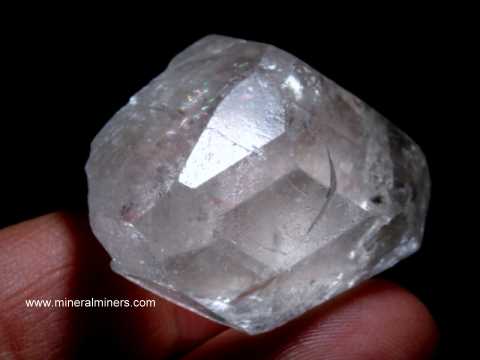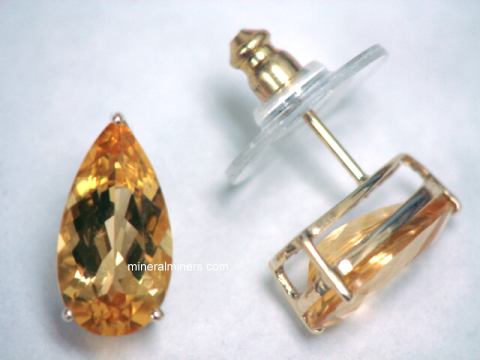



Links To Topaz Information Topics:
We have a variety of different cuts and sizes available in blue topaz gemstones including extra large giant size collector gems!
Return to the Index of Topaz Information
Topaz (Al2SiO4(F,OH)2) is an aluminum fluorosilicate.
It most often occurs
colorless, but topaz can occur naturally in a variety of colors such as pale blue,
yellow and brown. Some very rare colors do occur naturally in the gem variety known as imperial topaz<-em> with
orange, pink, red or violet hues. The colors in topaz are mainly the result of
color centers, which are sometimes affected to some extent by variations in the amounts of
F,OH and minor impurities present, with the exception of the pink, red and violet tones
in some topaz which
are due to chromium impurities in the imperial topaz crystal structure. Color centers
are not fully understood, but it can be said that they are created by radiation
and destroyed (reversed) by heating or in some cases by exposure to light.
These color causing 'color centers' can occur and be reversed by natural irradiation and
heating processes, resulting in the variety of colors exhibited by natural color
topazes, or they can be manipulated by artificial means. More than 99.9% of all blue topaz gemstones on the market today have
undergone an irradiation treatment to produce their blue color.
Sky blue topaz gemstones are made from natural colorless topaz by passing electrons through the topaz (just like the electrons passing through the wiring of your home - known as electricity). The resulting sky blue color in the topaz is permanent throughout the blue topaz gemstone and will never fade unless exposed to very high heat. In genuine sky blue topaz, there is no dangerous residual radiation in the topaz like there is with nuclear reactor irradiation - we have no nuclear reactor irradiated topaz, only sky blue topaz gems.
Some color centers in topaz
are stable until heated hundreds of degrees
while others are very unstable, fading within a few
days merely by exposure to sunlight. The natural color of the yellow to 'sherry'-colored to brown topaz crystals from
the Thomas Range in Utah, USA often exhibit this 'fast fading' phenomenon.
Yellow to 'sherry'-colored to brown topaz crystals from some other locations do not fade when
exposed to sunlight, indicating a light stable color center.
Much colorless topaz becomes a brownish-green color when irradiated. Subsequent
exposure to light or heat will usually cause the brown portion of the color to
fade leaving a blue color that is stable to light. Additional heating
will cause this blue color to fade and the topaz will become
colorless once again.
Some brown topazes that contain chromium impurities will become pink to violet
upon heating. These colors are stable to light and this process can be reversed by
subsequent irradition.
Topaz is thought to form from fluorine bearing gases given off during the later stages of
solidification in acidic igneous rocks, occuring in cavities and fissures
within rhyolites and granites, and also in granitic pegmatites where it is
commonly associated with
quartz, microcline,
muscovite, tourmaline & beryl. Other minerals sometimes associated with topaz in pegmatites are spodumene, lepidolite and apatite.
Topaz occurs in metamorphic rocks by fluorine metasomatism in greisens and
quartzites associated with fluorite, zinnwaldite,
corundum and rutile. It also occurs (rarely) in schists.
Topaz appears in hypothermal ore deposits associated with cassiterite, hematite,
wolframite and gold.
Blue Topaz
Return to the Index of Topaz Information
TOPAZ GEOLOGIC OCCURRENCE AND DIAGNOSTIC FEATURES


The name 'topaz' was used to refer to any yellow stone in ancient times.
Topaz was first used to describe the mineral that we know today as topaz in 1747 when Henckel
described the Saxony deposits. Even today one often encounters the erronious terms
smoky topaz and madeira topaz being used for smoky quartz
and citrine quartz, respectively. Until the 18th century, the name topaz was often used in refering
to our present day mineral peridot.
The name 'topaz' is thought by many to be derived from the ancient Sanskrit
word tapas meaning fire. Another theory which was first put
forth by Pliny in the first century A.D. is that the name topaz was derived
from the Greek word topazos or topazion meaning to seek, which was the
name of an island in the Red Sea (known today as 'Zeberget', or the 'Island of St. John')
which is thought to have been an ancient source for the gem peridot, but not topaz.
The term imperial topaz originated in Russia in the 19th century, when topazes
with pink tones were discovered there and proclaimed by the Czar to belong
only to himself and the royal family, and others to whom he had given it as a gift.
Topaz was one of the stones in the 'Breastplate of Judgement' of Aaron, described in the bible (Exodus: xxviii, 15-30). In Vedic astrology ( 1000's of years older than western astrology, and still practiced by millions today), topaz is asigned to the planet jupiter. Historically, topaz has been thought to give long life, good looks and to improve intelligence. It is also thought to provide protection from poison, disease and sorcery.
Topaz is used as a gemstone. Its perfect cleavage makes it susceptible to being damaged if struck upon a hard surface.
The astrological sign of topaz is Sagittarius.
Topaz is the symbolic gemstone for the 16th wedding anniversary.
Topaz is the birthstone for the month of November.
Topaz is said to enhance one's spiritual potential, to increase
intelligence and creativity, and to impart wealth & wisdom. It also is said to
aid in meditation and in the manifestation of the desired outcome. It is
said to facilitate working with other minerals, enhancing the results.
Topaz is said to be a strong rejuvenating and healing mineral,
giving re-newed vitality and good health, and protection against many diseases.
In addition to the above metaphysical properties for topaz, Blue topaz is said to enhance one's communicative abilities, helping to more easily and clearly express oneself.
For more in-depth metaphysical information, see our Metaphysical Books section.
Return to the Index of Topaz Information
See our page with links to mineral specimens of all mineral varieties!